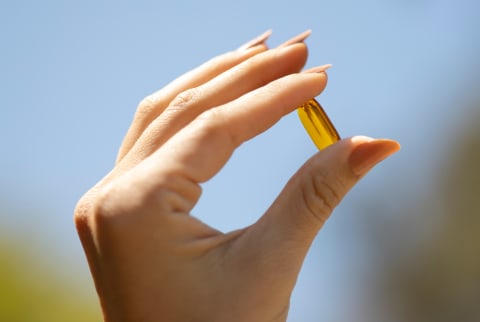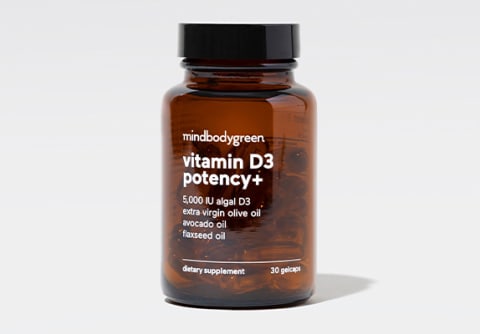Advertisement
D2 vs. D3: Why Form Matters When It Comes To Vitamin D


Ashley Jordan Ferira, Ph.D., RDN is Vice President of Scientific Affairs at mindbodygreen. She received her bachelor's degree in Biological Basis of Behavior from the University of Pennsylvania and Ph.D. in Foods and Nutrition from the University of Georgia.
Everyone seems to be talking about the importance of vitamin D (myself included). In time, it's become the vitamin to rival even the famed vitamin C.
But when we talk about increasing our vitamin D intake, it's helpful to be clear about the specifics of what we mean, exactly. After all, the body doesn't use all types of vitamin D in the same way; it prefers one kind over another.
It seems complicated, but that's what we're here for. And the more you know about what type of vitamin D you're supplementing with, the more your body will reap its exceptional benefits.
What is vitamin D?
"Vitamin D is both a vitamin and a preprohormone (plus a full-on hormone in its active form in the body) essential for healthy bodily function,"* integrative and functional medicine physician Alejandra Carrasco, M.D., previously wrote for mbg. That's after two activation steps in the liver and then the kidneys. Vitamin D can be synthesized in the skin when exposed to the sun. You can also consume the fat-soluble micronutrient from a few sources—plant-based (e.g., algae), animal-derived (e.g., eggs and fish), and even fungi (e.g., UV-irradiated mushrooms).
But here's the thing: Most of us aren't getting enough vitamin D. Research indicates anywhere from 931% to 100% of American adults fail to consume just 400 IU of vitamin D every day. (And if you're wondering, that's a meager amount already and ineffective at helping you achieve healthy vitamin D status.)
Although our bodies can produce some vitamin D on their own with exposure to sunlight, spending too much time inside is not the main reason D deficiency and insufficiency rates are 29% and 42% among U.S. adults2, respectively. With only a handful of foods containing a significant amount of vitamin D (or any at all), getting enough of the essential fat-soluble vitamin from diet alone just isn't realistic.
Truthfully, the most effective way to get your levels up is to take a high-quality daily vitamin D supplement. (Don't worry, we've vetted and compiled the best options for you.)
mindbodygreen recommends an efficacious dose of 5,000 IU of D3 daily for adults to achieve (and more importantly, sustain) optimal levels of 50 ng/ml.* If you're interested in finding out if you're getting enough vitamin D or if your supplement is actually working, you can have your doctor order a serum total 25-hydroxyvitamin D blood test, aka 25(OH)D for short. (And if you have stubborn vitamin D levels, check out these 10 possible contributing factors.)
If you're wondering if you can skip the vitamin D and still bolster whole-body health—think again. Vitamin D is crucial for your bone, teeth, muscle, immune, and skin health (to name a few).* It regulates the production of thyroid hormones, nurtures a healthy pregnancy, promotes gut health by supporting beneficial gut bacteria, regulates mineral balance and promotes bone density, contributes to longevity, and even supports cognitive function and mood.* The fat-soluble nutrient is deemed "essential"—and for good reason.
Summary
Is vitamin D the same as D3?
Vitamin D can be found in two different forms—D2 and D3—based on source and biochemical structure. "D2 (ergocalciferol) is only derived from plant sources and is often in fortified products. D3 (cholecalciferol) is from animal sources and can be synthesized in the skin from UVB light," shares registered dietitian nutritionist Patricia Bannan, M.S., RDN, author of From Burnout to Balance.
Vitamin D2 and vitamin D3 also differ structurally—i.e., D3 is far more stable and therefore has superior bioactivity and bioefficacy (more on that later).* Although generally found in animal products, there's one very important caveat to mention: D3 can also be found in algae and lichen, which allows for a plant-based D3 supplement (although algal D3 is much more sustainable for the environment than lichen).
In a recent Frontiers in Immunology 3scientific review3, researchers determined D2 and D3 influence the expression of genes differently and, therefore, affect the immune system in overlapping but different ways. Some of the findings of this research indicate that it is possible D2 supplementation could even counteract the benefits of D3 intake. The message is that we really don't know the full extent of the differences between D2 and D3 (but we know quite a bit; read on to learn more).
Summary
Which form of vitamin D is more beneficial?
Form matters when it comes to supplementing with vitamin D. According to Bannan, D3 is the body's preferred form of vitamin D because it's produced in the body naturally and is more efficient at increasing blood levels. In fact, D3 is 87% more potent and effective4 at raising and maintaining serum 25(OH)D levels than D2. And since 25(OH)D levels are your status biomarker, that's a majorly impactful difference.
D2 is significantly less effective because of the structural differences that affect the way the body metabolizes5 the vitamin. Vitamin D2 also has increased catabolism3 (i.e., it's broken down, or metabolized, more quickly) and its metabolites have weaker binding affinity3 to the vitamin-D-binding protein (i.e., the major vitamin D transport protein that carries the nutrient to the rest of the body to confer all those wonderful health benefits we highlighted before).
"These two nutrients are not biologically equivalent or interchangeable," Ashley Jordan Ferira, Ph.D., RDN, mbg's vice president of scientific affairs, previously wrote for mindbodygreen when dissecting D3's scientifically proven superiority over D2. "One is effective (vitamin D3), and the other is way less effective (vitamin D2). Any suggestion that vitamin D3 and D2 are both good options falls into the 'bad science' bucket."
When it comes to bioactivity, vitamin D3 has been shown to raise free 25(OH)D levels—an up-and-coming biomarker that may be more sensitive than total 25(OH)D—with greater efficacy than D26. "This is yet one more compelling piece of evidence cementing the superior bioefficacy of D3 over D2," Ferira concludes.
Overall, if you're looking to increase your vitamin D levels and experience the myriad benefits of sufficient D status, vitamin D3 is the way to go. "Supplementing with D3 instead of D2 will give a greater likelihood of significantly changing vitamin D levels in the body,"* shares registered dietitian Maya Feller, M.S., R.D., CDN, of Brooklyn-based Maya Feller Nutrition.
Summary
Sources of vitamin D3.
So what are some sources of vitamin D3? Most dietary sources of vitamin D3 come from animal foods including:
- Salmon
- Cod liver oil
- Trout
- Eggs
But there is one significant vegan source of this preferred form of D3: algae.
mindbodygreen leverages sustainable, organic algae in vitamin D3 potency+ (plus, there's a trio of organic avocado, flax, and olive oils for built-in absorption advantage!), making it the perfect supplement for plant-based individuals and omnivores alike.*
The takeaway
"Unlike some nutrition queries that are somewhat gray and equivocal in nature, when vitamin D3 and vitamin D2 go head-to-head, the winner is clear," concludes Ferira.
To experience the sweeping benefits of this sunshine vitamin, taking 5,000 IU of vitamin D3 paired with a fat (for optimal absorption) is the best option. Because of the limited food sources of vitamin D3 (especially for plant-based eaters), taking a high-quality vitamin D3 supplement, like mbg's vitamin D3 potency+, is the easiest and most effective daily ritual to increase your vitamin D levels (and keep them there).*
6 Sources
- https://www.ncbi.nlm.nih.gov/pmc/articles/PMC5579642/
- https://www.cambridge.org/core/journals/british-journal-of-nutrition/article/vitamin-d-deficiency-and-insufficiency-among-us-adults-prevalence-predictors-and-clinical-implications/44E436843510FE6BDE856D5BCB9C651F
- https://www.ncbi.nlm.nih.gov/pmc/articles/PMC8908317/
- https://pubmed.ncbi.nlm.nih.gov/21177785/
- https://www.ncbi.nlm.nih.gov/pmc/articles/PMC3349454/
- https://pubmed.ncbi.nlm.nih.gov/27192696/
Watch Next
Enjoy some of our favorite clips from classes
Enjoy some of our favorite clips from classes
What Is Meditation?
Mindfulness/Spirituality | Light Watkins
Box Breathing
Mindfulness/Spirituality | Gwen Dittmar
What Breathwork Can Address
Mindfulness/Spirituality | Gwen Dittmar
The 8 Limbs of Yoga - What is Asana?
Yoga | Caley Alyssa
Two Standing Postures to Open Up Tight Hips
Yoga | Caley Alyssa
How Plants Can Optimize Athletic Performance
Nutrition | Rich Roll
What to Eat Before a Workout
Nutrition | Rich Roll
How Ayurveda Helps Us Navigate Modern Life
Nutrition | Sahara Rose
Messages About Love & Relationships
Love & Relationships | Esther Perel
Love Languages
Love & Relationships | Esther Perel
What Is Meditation?
Box Breathing
What Breathwork Can Address
The 8 Limbs of Yoga - What is Asana?
Two Standing Postures to Open Up Tight Hips
How Plants Can Optimize Athletic Performance
What to Eat Before a Workout
How Ayurveda Helps Us Navigate Modern Life
Messages About Love & Relationships
Love Languages
Advertisement

What Men Are Getting Wrong About Mental Health, From A Psychologist
Stephen B. Poulter, PhD

Your Grandma's Go-To Supplement Is Once Again Popular (For A Good Reason)
Molly Knudsen, M.S., RDN

What Men Are Getting Wrong About Mental Health, From A Psychologist
Stephen B. Poulter, PhD

Your Grandma's Go-To Supplement Is Once Again Popular (For A Good Reason)
Molly Knudsen, M.S., RDN















